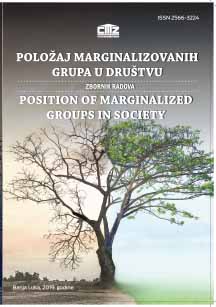Roditelji ovisnici o opijatima i djeca suovisnici kao marginalna skupina
Drugs addicts parents and children of parents of addicts as marginalzed group
Author(s): Jasminka ZlokovićSubject(s): Social Sciences, Sociology, Substance abuse and addiction, Victimology
Published by: CENTAR MODERNIH ZNANJA
Keywords: children of parents of adicts; addicted parents; marginal groups; prevention
Summary/Abstract: This paper presents scientific-educational discussion about children of parents of addicts and shows distinction between declarative and real state that refers to problem marginalization of a large number of juvenile children. Drugs addiction is complex personal, family and social problem. In Croatia during the 2017/2018 years, rate of treated addicts was 248,3 (248,3 persons on 100.000 residents at the age of 15-64 years old). A large number of addicts had children (37,6%). Children are exposed to lack of parental care, existential, material and physical deprivation, inadequate health care, family violence and often criminal acts by growing up with one or both parents of addicts,. All of the above, make these children a high-risk group. Some children of addicted parents are relieved of the care of older family members (grandparents, cousins), children's homes and foster families, although unfortunately there are many examples where children continue to live with their parents, drugs addicts. Children of parents of addicts represent a specific high-risk group of children which often try to take over self-care and care for their parents. Although there is a declarative level that guarantees help and protection, especially in risky situations, in everyday practice the real situation is much different. Scientific papers and literature are not sufficiently focused on the problems and needs of children of parents of addicts. This high risk group of children are marginalizied even in the prevention programs and we can wonder if the institutions of child protection and legislation and the legal-judicial system, the social and educational institutions had failed in protecting and care one of the high-risk and vulnerable groups of children. The human development approach to the complex problem of the devastating effects of addiction on the family includes, among other things, the promotion of primary prevention and strengthening the better functioning risky families and their children, in which the educational and social institutions have a respectable role.
Journal: DRUŠTVENE DEVIJACIJE
- Issue Year: IV/2019
- Issue No: 4
- Page Range: 11-21
- Page Count: 11
- Language: Croatian

